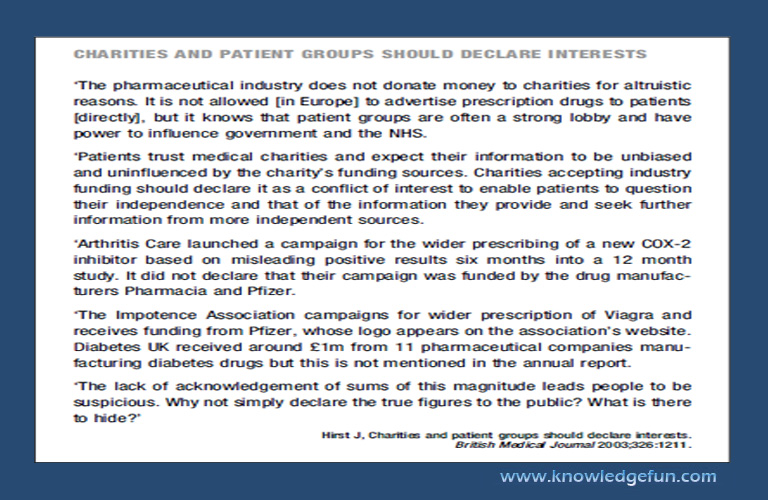Chapter VII
IMPROVING TESTS OF TREATMENTS IS EVERYBODY’S BUSINESS
Today, there are moves away from clinicians imposing treatments and research on patients. It is no longer acceptable to measure ‘success’ by patients’ unquestioning compliance with the treatments prescribed. A better way to provide treatments that patients identify as important and relevant to their care is to encourage shared responsibility for making decisions, for taking medicines, and for testing health interventions of all kinds.
PATIENTS NEED INFORMATION
Patients in partnerships in healthcare need access to good quality, understandable information – whether in the one-to-one relationship of a consultation, or when considering whether they should join a trial, or as members of research teams. Without this, there is little prospect of meaningful dialogue and real patient involvement.
Patients regularly complain about lack of information. Although some prefer not to have detailed information about their illness and treatment options and to leave things entirely to their professional advisers, many are keen to learn more. They want to know and understand how the results of treatment tests have a bearing on them personally. For them, openness and transparency are essential. They need the assurance that everyone knows what tests of treatments are going on; that results are published, whether ‘positive’ or ‘negative’; that systematic reviews of all the relevant evidence are undertaken and kept up to date; and that adverse effects are not covered up. Clearly, patients need to be sure that researchers know what has already been done before embarking on new research: as we have outlined in earlier chapters, patients have suffered when researchers have not bothered to find out what has gone before.
One early example of patient support for and involvement in proper evaluation relates to the introduction of chorionic villus sampling in the 1980s. Chorionic villus sampling is a way of diagnosing abnormalities in the fetus at an earlier stage of pregnancy than is possible with amniocentesis. Despite the real possibility that the new technique would be more likely than amniocentesis to provoke miscarriage, it had been taken up by women at very high risk (1 in 4) of carrying a fetus with a severe inherited blood disorder. For these women and their families, the wish to avoid bringing into the world a child who would suffer pain and an early death outweighed the potential risk that the new technique might provoke the miscarriage of a normal fetus.
However, the balance was very different for other women who were much less likely – between 1 in 50 and 1 in 200, for example – to have an affected fetus. For them it was important to know whether the more invasive test – chorionic villus sampling – was indeed more likely than amniocentesis to provoke a miscarriage or some other problem. Consequently, the Medical Research Council backed an international collaboration to address these questions. This initiative was supported widely by the press. In the UK, for example, most journalists applauded the planned research and emphasised the importance of careful evaluation before deciding whether new medical techniques should be adopted more widely.

CHARITIES AND PATIENT GROUPS SHOULD DECLARE INTERESTS
‘The pharmaceutical industry does not donate money to charities for altruistic reasons. It is not allowed [in Europe] to advertise prescription drugs to patients [directly], but it knows that patient groups are often a strong lobby and have power to influence government and the NHS.
‘Patients trust medical charities and expect their information to be unbiased and uninfluenced by the charity’s funding sources. Charities accepting industry funding should declare it as a conflict of interest to enable patients to question their independence and that of the information they provide and seek further information from more independent sources.
‘Arthritis Care launched a campaign for the wider prescribing of a new COX-2 inhibitor based on misleading positive results six months into a 12 month study. It did not declare that their campaign was funded by the drug manufacturers Pharmacia and Pfizer.
‘The Impotence Association campaigns for wider prescription of Viagra and receives funding from Pfizer, whose logo appears on the association’s website. Diabetes UK received around £1m from 11 pharmaceutical companies manufacturing diabetes drugs but this is not mentioned in the annual report.
‘The lack of acknowledgement of sums of this magnitude leads people to be suspicious. Why not simply declare the true figures to the public? What is there to hide?’
Hirst J, Charities and patient groups should declare interests.
British Medical Journal 2003;326:1211.





